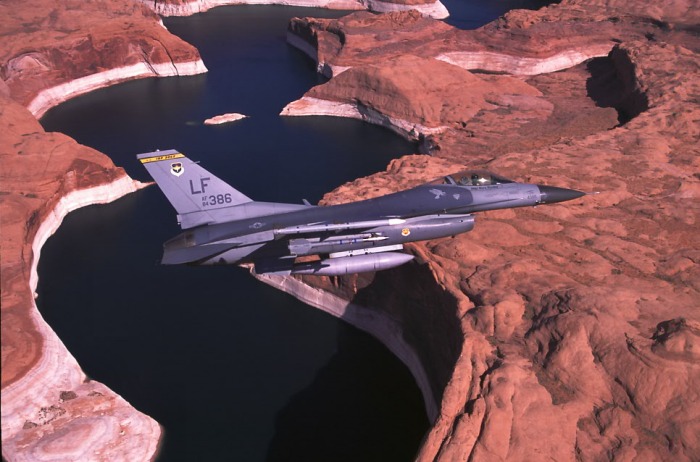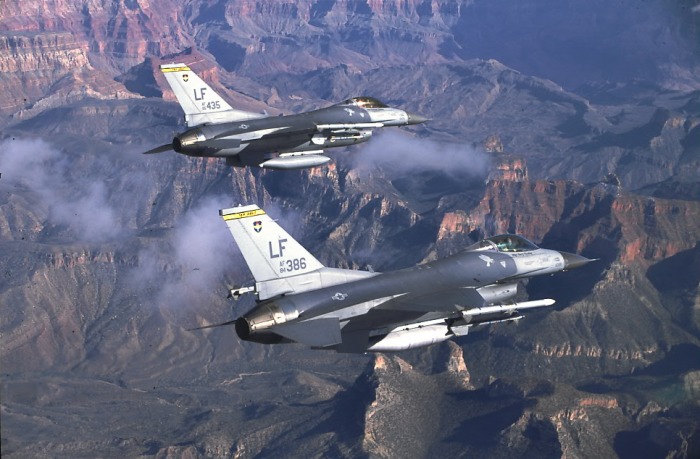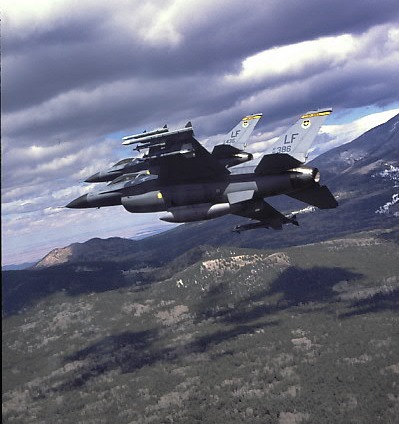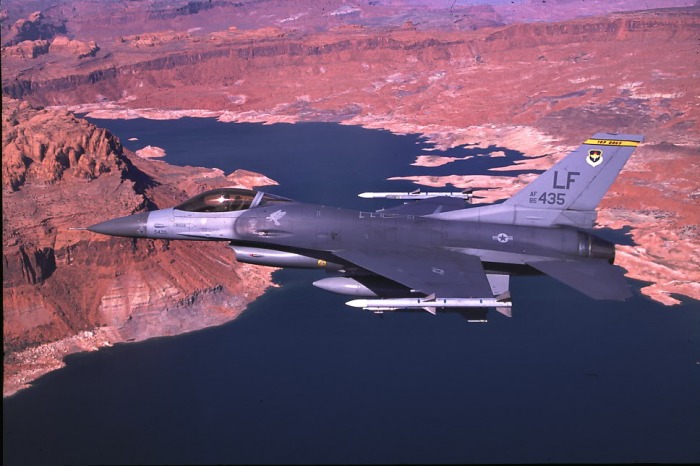
The 56th Fighter Wing recently hosted a two day visit
by Dash 2 Aviation Photography that included a fantastic
photo flight. “It may rank up there as my most
enjoyable, and productive photo flight” comment’s
Rick Llinares. The 56th Fighter Wings official stated
mission is to “Train the world’s finest
F-16 pilots and crew chiefs while providing agile
combat support for air and space expeditionary forces.”
The Wing is part of the USAF’s Air Education
and Training Command and is home to 200 F-16’s
and more than 8 individual F-16 squadrons. Current
Wing Commander Colonel Philip M. Breedlove states
his view on the Wing’s mission directly,”
We train 95 percent of the USAF F-16 pilots, as well
as the maintainers. These pilots can, and do complete
their training with us, and one month later could
possibly fly combat operations for their country.
Of equal importance is the fact that we also train
all the maintainers of the F-16.”
The F-16 Fighting Falcon or “Viper” as it
is unofficially called is the workhorse of the USAF’s
tactical combat fighting force. The effectiveness
and high sortie rates the F-16 has enjoyed in the
many operations it has taken part in is a testament
to the pilots that fly the jet, and the ground personnel
that keep them serviced and flyable. Colonel Breedlove
adds,” To place our value in perspective, during
the first Gulf war about 50% of the F-16 pilots/maintainers
trained here at Luke AFB. During the recent actions
in Afghanistan and Iraq, over 90 percent of the pilots/maintainers
flying and servicing the F-16 where trained by the
56th. The F-16 makes up over half of the fighter aircraft
force of the USAF and is the only fighter aircraft
capable of fulfilling every major mission type.”

Luke AFB is the largest and only active duty F-16
training base in the world. Flight operations take
place from early in the morning up until midnight.
The 56th FW conducts over 200,000 flights each year.
The 56th Fighter Wing also has access to the massive
2 million acre Barry M. Goldwater ranges in the south
western part of Arizona. The range is the perfect
training ground for fledgling F-16 Viper pilots to
learn their complex craft all under the careful supervision
of the Wings highly qualified Instructor Pilots (IP).
Colonel Breedlove notes that the ranges are one of
the main reasons the Wing is able to fulfill its mission.
“The ranges are the critical component to our
success. To do our job, the training requires airspace
and the Goldwater ranges are the best available. We
have the basic bombing ranges to introduce the students
to the air-to-ground mission. At the next level, we
have tactical ranges that allow the students to fly
against target arrays similar to those threats faced
in combat. We also have Military Operating Areas (MOA’s)
and restricted ranges that are used for realistic
air-to-air training. One of our greatest challenges
is managing the use of the needed airspace and ranges
in close proximity to a growing, thriving city like
Phoenix.”

Turning a pilot fresh out of the training command
into a combat ready F-16 fighter pilot is an intense
nine month training program. The typical student has
had a year of flight training and a follow on six
week Fighter Fundamentals course in the AT-38 Talon.
The program, simply dubbed the B course, turns out
a qualified F-16 wingman. The curriculum is divided
into three major parts or phases that are then segmented
into blocks consisting of more specific types of missions.
Major Anthony “Stick” Abernathy, an Instructor
Pilot with 7 years and 1,300 hours in the F-16 and
the Wings Flying Executive Officer explains, “The
three main phases are Transition, Air-to-Air and Air-to-Ground.
Transition is where they learn how to fly the plane
in a very basic format. Air-to-Air has them learn
the basic fighting skills and how to employ the airplane
as a wingman with another aircraft and their own.
The final phase, Air-to-Ground is pretty simple; drop
bombs, fly low to the ground.”

61st Fighter Squadron Instructor Pilot and Squadron
Programmer Major Patrick “Hondo” Encinas,
also a high time “Viper” pilot with 1600
hours in the F-16 feels that the most challenging
aspect of teaching a new pilot to fly the F-16, is
getting them to “Think, act, walk and live like
a fighter pilot. The mistakes always begin with walking
in the door. The environment is so challenging and
complex that rarely does a student walk in the door
before he meets his first mistake face-to-face. Mistakes
are part of the program not only for the students
but also the Instructors. We operate as professional
fighter pilots as a team and we are in a continual
learning environment on how to better and more efficiently
operate as an instrument of war.”
Dash
2 would like to thank the 56th Wing for their support
with particular thanks to Wing Commander Colonel Breedlove,
Captain Vanessa Hillman (Public Affairs), the 61st
Fighter Squadron and Major Patrick Encinas, Major
Anthony Abernathy, Captain Brian Kilian as well as
Tech. Sgt. Kathleen Matthews, Major Mike Paoli and
Mr. Doug Thar.
|

